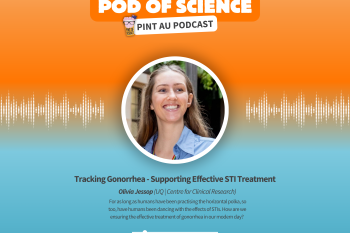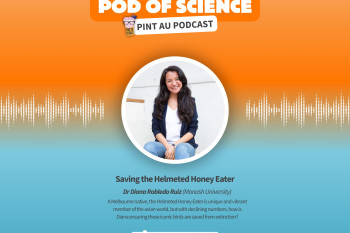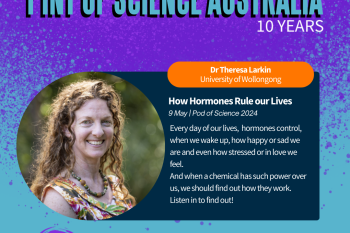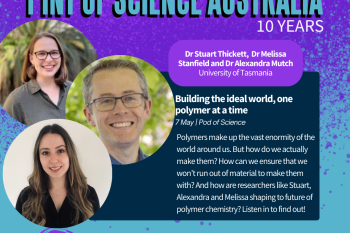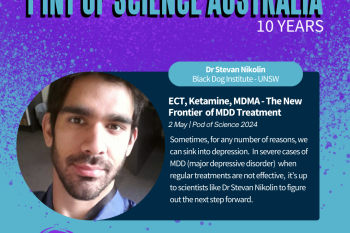© Pint of Science, 2026. All rights reserved.
Andrew Barron talks to us about why he finds insects so fascinating and what he thinks is the future of cognition studies.
~~
Transcript
Camille Thomson: Welcome to a Pod of Science part of the Pint of Science Festival and I'm here talking to Andrew Barron. How are you today Andrew?
Andrew Barron: I’m good mate how are you?
Camille: I’m great excited to be speaking today. I'm excited about your topic so if you could tell us a little bit about what it is that you do.
Andrew: I study the evolution of intelligence. I study how animals think and I try to work out how minds evolved rather than how brains evolved and that involves working out how you can get thought and intelligence and mind out of a nervous system and that's what I do. That's how I do my day to day.
Camille: So, the difference between a brain and a mind is the squidgy stuff versus what you get out of it?
Andrew: Oh boy. We could… entire books have been written about the difference between brain and mind whether there is one. I talk about... so I’m not a dualist - he says very quickly - but what I study is cognition. I study cognition. I study how animals think and how their minds work. That's the way to think about it. So, for me it's about understanding how a dynamic nervous system can give you intelligent behaviour and it's about understanding that relationship that's what I do.
Camille: So, what led you into this area of studying animals and how they think?
Andrew: That's been a lifelong fascination, it really has, and I focus mostly on insects. And for me insect behaviour is incredibly telling here because often when we're looking at animals often we struggle to even imagine how they're thinking because we lock ourselves up behind our preconceptions of how they're thinking. And we trap ourselves behind that anthropomorphic extension that we give. So we imagine in enormous detail what our dog is thinking about, when our dog is doing something crazy, and the interesting thing about insects is we don't do that. We find ourselves locked in this duality and that because their bodies are so unlike ours and their heads do not and their faces don't move and their heads don't emote and they don't react we can simultaneously hold two models in our head. So sometimes look at an insect and you think that is an intelligent interactive animal that's interacting with me and sometimes you look at it more often for most people they look at it and think that's nothing but a robot that's a tiny automaton doing something it's a mechanism. And the nice thing with insects is we hold these two different interpretations about what's going on and that duality was always fascinating for me. And that question of what is going on in the mind of an insect and do they even have something that we could reasonably call a mind that was always really fascinating and that naturally led over quite a long very indirect path into this study of how different animal minds work. And I think insects are particularly still continue to be particularly revealing. Because it's not just that that we can study them in so many ways and we don't have that anthropomorphic problem to such a degree. It's because their brains are so much simpler, we're actually making much more rapid progress in the difficult job of relating a nervous system to what they're actually doing
Camille: So, what was the first insect you studied?
Andrew: I’ve got to think, ladybird! European ladybird was the first one I studied that was a long time ago. Before that it was a tardigrade and tardigrade are absolutely wonderful, but tardigrades aren't an insect obviously, but they're magnificent. And then it was a ladybird and that was a lot of fun. And then it actually was bees but diverse sorts of bees particularly bumble bees then drosophila for a while and then a long obsession with the honeybee
Camille: A lot of people like bees or maybe just obsessed with honey.
Andrew: No need to apologize for that that's fine.
Camille: So, what are some of uh the obstacles you're finding in this area what are some of the things that make research difficult?
Andrew: It's weird… I don't I don't oh gosh I don't think… It's always, I mean research is always difficult by nature it's difficult. If it wasn't difficult it would be done and then it wouldn't be research. So it's always difficult. But I don't think of the obstacles. The obstacles become the fun bit because they're the bit that you have to work out “How on earth are we going to actually do this?” and then it becomes the fun bit. And the funny thing is that in my career, which is now embarrassingly long, you've just seen the capacity and the potential for what you can do accelerate every year. So projects that we would have thought that's completely unfeasible are now entirely feasible and doable and solvable on a reasonable budget in a couple of years, and that's remarkable. So the obstacles that we have are just the things that remain the fun bits that we have to work out what we're going to do.
Camille: I like that! I was curious you know there's a lot of people with animal testing particularly on products a lot of people haven't have a big opinion on that. Have you come up against that with working with insects? Do people tend to take as big a stand?
Andrew: It's very diverse. So I wouldn't say that no one does because certainly some people do. The whole ethical approach to insects is interestingly odd. As far as I’m aware, someone will tell me if I’m wrong, no country has a formal ethical protection of insects on the basis of their humane handling. Whereas obviously for vertebrates we have ethical guidelines that we must subscribe to for their use either in food production or in research or in any other way that we interact with them. And we don't extend those kinds of protections to the invertebrates with the sole exception being in some countries some of the cephalopods which we consider to have a capacity for some form of intelligence. And we consider for some reason that makes a difference. I think a lot of these ethical decisions are utilitarian rather than science based. I think it's interesting that we I think we should have cause to question the basis on which we've made these very odd very flat footed, phylogenetically indefensible assumptions. What we've always done in my group and I can say this also for all the groups I’ve interacted with is we have our own guidelines of ethical behaviour in our research. And to be honest with you I can't think of an insect lab that I’ve worked with that wouldn't have that. I personally take the ethical treatment of the animals I work with very seriously, I do. I have killed animals in the course of my research, of course I have, um however I would like to think the knowledge gained has justified that cost and it is a cost. And I would like to think that I’ve been mindful of the humane handling of the animals in my research. The nice thing about also being a beekeeper is I once did a calculation and I’ve enabled the lives of over 100 million bees for every bee's life that I’ve taken over the course of my career. And that's not counting the benefits to bee health and welfare that have come out from my applied research on the impacts of pesticides and pollutants on bees. So it's interesting with the insects it's really interesting in the ab, in an ethical vacuum I think many of the labs I work with are doing the best we can they're certainly aware of it and I’m certainly open to the criticism that we shouldn't be using animals at all in our research. But I would hope that that's a conversation we could have rather than an absolute.
Camille: Yeah. So I wanted to know, just to lighten up a little bit, uh what was the most interesting study you've done? Is there something that stands out?
Andrew: Oh no, you're asking me to name one!
Camille: Like picking a favourite child.
Andrew: It is and you can't. Actually as a parent you probably can, I’m not a parent but I’m sure you probably would pick a favourite child. I’m sure I wasn't. I could not name one of my favourite studies I’m not even going to try and it always ends up being the most current one. And then you go through this weird thing, like then there's the moment when you publish it when you absolutely hate it because you realize how you're obsessed that you got it wrong then for several years, but then it sort of cycles back up into being something you like. The stuff that you're engaged with currently tends to be the one that is the brightest and the shiniest.
Camille: Was there one that um got a big uptake say in the media or something that you didn't expect it to?
Andrew: Oh gosh the bees on cocaine, that was that got and continue to got and obviously it got an awful lot of media. That was um that was voted the by Wires magazine the third most pointless scientific study of the year in I think it was 2008. I’m still slightly proud of that.
Camille: Definitely something to be proud of.
Andrew: Yeah it got on the Colbert show, Stephen Colbert talked about it um and it had this fantastic write-up in the New Yorker. Yeah that's definitely my most misunderstood study for sure.
Camille: Definitely. So um what do you think the future researchers in your area will be working on? What do you hope that a future researcher will be working on in your area?
Andrew: Oh I hope that future researchers in the area that i work on will be absolutely working on comparative studies of consciousness and the nature of different animal consciousnesses and how different systems can support different forms of consciousness. That's what I hope. So that we'll see consciousness become an absolute comparative experimental research program. That would be enormous fun. And of course that research program would extend not just across animal minds but also across the various AIs that by this point we will be creating and we'll be having very very complex intelligent informed discussions about what this all means. That that's what's ahead.
Camille: Does sound very exciting. But yeah comparing Ais, it’s something to think about. So looking into a future where AI exists uh what do you think the biggest obstacle for science is right now?
Andrew: I think it's one that we're already aware of and I think it's one where we're going to see enormous progress in the next couple of years so this is not like a far horizon thing, I think we're aware that you know AI is advancing but it's not advancing the way that we would like it to be advancing. And that we don't have artificial intelligences that we can interact with in the ways that we would like to interact. So we've seen movies like Frank and me [Robot and Frank] and things like that and all these things and we haven't got those kinds of solutions yet. And I think I think that part of that is that AI's gone in the direction of a bit of brute force. It's using enormous compute power and the power of machine learning and deep learning to create very, very smart classifiers that can be trained over with a lot of repetitive training and with enormous data sets. And they can be trained to do some very complex things that we thought they couldn't do like betas in games of go and beat us in strategy games and even learn to spontaneous spontaneously learn how to play Atari games and things like that. But it's still not the kind of things that we thought AI would be doing with us. And I think if we want to solve what we want which is AI that can interact with us and that we can interact with, I think we need to make AI that is more inspired by how we think. We need artificial intelligences that think more naturally, that think that are more like the way a human brain works. And I think that's what we're going to see emerging and there's many groups that are working on that already. And again I think a comparative perspective is really useful here because we don't need AI that thinks like humans to be useful and we may not want that.
Andrew: We may want something for example, that thinks more like a dog or even thinks more like an insect. So it's really good at a specific task rather than have a very high level of general intelligence. So I think that's what we're going to see emerging in the in the near future of AI because I know it's already happening.
Camille: I’m not one for you know AI and computing but I’m sitting on the fringes, it's definitely something that looking forward to seeing what's coming out of all this. So you mentioned being a beekeeper and obviously you study insects so just quickly do you keep your own bees, or do you do it only with when it's associated with your research?
Andrew: So we have a fantastic apiary at the university and I have the most brilliant beekeeper his name is Sean and I love him to bit. And he is an absolute legend. And we keep a lot of hives at that university. I don't keep hives at home that's only because I need to duplicate all the equipment and it's actually better for me to have the hives at the university. They're like my best and my most fun days are the days when I can be out in the bee yard messing around with the beehives.
Camille: Are you happy that a lot more people are trying to find ways to put hives in their backyards?
Andrew: I absolutely I think that the… I think everyone should be a beekeeper. Is what I think, I think everyone should be a beekeeper. I think it is quite transformative in how you interact with nature. And if you ever want to be in a room of intelligent, deeply engaged, thoughtful, concerned, ecological, community-minded people put yourself in a room of beekeepers.
Camille: I found that yeah, they get they're quite involved, and they see a lot more than just the hive it's the world around it and everything else that goes along with it.
Andrew: It also.. it's a weird way and I think every beekeeper will feel this. It also gives you a profound sense of the - I’m about to get really fluffy here - a profound sense of the interconnectedness with nature. Because you're watching this beehive, which is this astonishing social structure, and you can see it in quite intimate detail because we've learned over thousands of years how to keep bees so they're happy and they interact very well with us. So you have this intimate access into their society but also you're aware that everything that they're doing they're harvesting from all the flowers in your entire neighbourhood and gathering these hidden minute droplets of honey and these tiny specks of pollen and bringing that back and converting it into this factory that produces more bees and produces kilos and kilos and kilos of honey. And you get this incredible sense of how ecologies, when they're healthy, can work so well and you also get a deep respect for that and a profound sense of their fragility.
Camille: I think honey is a very magical thing you know sort of all the little drops.
Andrew: Yeah it is.
Camille: So, my final question is um why did you choose to be a part of Pint of Science?
Andrew: Oh look Pint of Science is fantastic. I mean I mean anything that that gives a chance of people to come together and to learn about science is just a uniformly brilliant thing. And I met one of my now well certainly one of my most brilliant colleagues and what I’m pleased to say is one of my now best friends through a Pint of Science event, just as a random like “We should probably talk shouldn't we?” moment, which turned into an incredible collaboration, that's still ongoing. So I think I think Pint of Science is fantastic and the sooner we can get back into pubs the better.
Camille: How many times have you done a Pint of Science event?
Andrew: Have I done a Pint of Science? You know I’ve only done a Pint of Science twice.. been to more than that. I’ve done this would be my third one I think.
Camille: Excellent! No it's usually that you've been to a few and then someone finally convinces you to get up the front and say it. Well it has been really lovely chatting with you today Andrew and hearing all about your work on cognition and animals and I look forward to giving you more chances to tell more people about your work and spread the love.
Thank you so much for your time mate, much appreciated.
Camille: Thanks Andrew.
Camille: You have been listening to a Pod of Science, part of Pint of Science Australia. Don't forget to follow us on Twitter, Facebook and Instagram. And you can find all of our episodes on SoundCloud, and Spotify. Remember Pint of Science is a voluntary organization, and your support helps us bring the festival to you each year. Log on to pintoscience.com.au and find out ways that you can support your festival.
